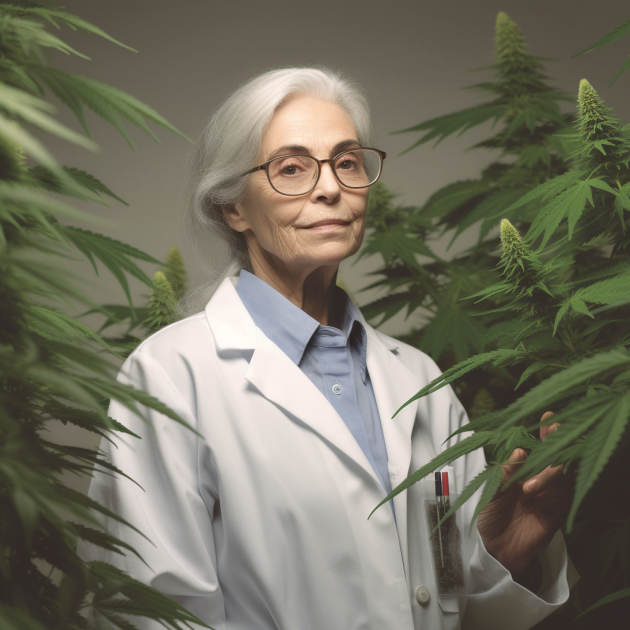Your Doctor Probably Tokes, But You Would Never Know
Art Courtesy of Rebekah Jenks
Walking into my job’s occupational health office sends my stomach into more twists than a pretzel. In my profession, an employee physical is standard. Also like many professions, a drug test is utilized for screening. When I got the job offer several years ago, I made sure that my urine was pristine. I hate that my employer can demand a cup of piss from me at any time, but they have yet to randomly test me.
The reason I walked into occupational health last week with an armpit full of piss was for a “lateral” promotion. You see, I’m a medical prescriber working in an outpatient clinic located in a non-legal state. I carry a little bottle of synthetic urine with me during work hours, wherever I go. Call it anxiety, call it overkill, call it smart, call it whatever you want. I call it insurance.
I didn’t need to use it this time because my job-lords only wanted some routine blood work. So, I wrapped the bottle in a baggy and secured it in its rightful place – my work bag’s secret pocket. Oh, and my medical specialty? Psychiatry. I treat patients with mental health and substance use disorders. When someone says “doctor”, an image immediately pops into most people’s minds. Usually a white male in an even whiter coat; a model of virtue. Society expects physicians to practice medicine ethically. This includes working with faculties intact, free from impairments. But wouldn’t you know it, there are doctors, physician’s assistants, nurses, psychologists, and counselors, and others who all consume cannabis. You rarely hear about us because we don’t want you to know. And more importantly, we don’t want our employers to know.
We are your healthcare providers, treating you with care, knowledge, and compassion. We, like you, also like to relax with a joint. Do you care if your doctor smokes pot? What if your doctor grows pot? Many states allow recreational use of cannabis, medical providers included. However, many employers don’t.
Did you know medical professionals have been jailed and even federally charged because of possession and cultivation of cannabis? They have lost their jobs and their reputations. For example, Dr. Paul Ezell,an ophthalmologist in Pennsylvania was arrested in 2014 for growing cannabis in his Philadelphia home. He was cultivating cannabis to help his wife in her fight against an opioid addiction. The kicker? She had already passed when his home was ruined. He was later pardoned when medical marijuana became legal in Pennsylvania, but not before serving 6 months in jail.
Dr. Joseph Kaya (pseudonym), an anesthesiologist gives his opinion:
“I do my job with the utmost responsibility and integrity, and it brings me a lot of meaning in life. I don’t openly talk about cannabis growing/using with others. My wife, a few trusted family members and just a few of my friends who also enjoy its use on occasion are the only people in my life who know. I come back to work more revitalized and more patient after being able to relax, loosen up, and feel some joy at home when I casually use cannabis. The level of frustration and variability of my day would burn me out so bad that I would quit this job on the current path it’s been on, and the majority of my colleagues feel the same way. I try to take care of myself at home to be a better husband, father, brother, son etc. as well as a physician, and cannabis facilitates that. Regardless of my work experience, resume, etc., my employer would replace me tomorrow if they found a cheaper way. Being able to relax and feel some joy in my limited weekends and time off helps to prevent that reality from filling me with rage every day, and allows me to still do this job and be a better person.”
It is taboo in the medical community to discuss cannabis use. Clearly, there is little incentive to
disclose it with colleagues, and the ramifications of losing our licenses and being jailed are too severe to even think about openly advocating for it. I personally keep up with medical research, and I’m pleased that there are now studies looking into marijuana’s ability to treat symptoms of post-traumatic stress disorder and anxiety. However, these studies are usually small and tend to isolate a single cannabinoid.
I subscribe to Dr. Kaya’s view, that “Many of those in the medical community have evolved with the times and hold a more moderate position on it, and I know many who use it recreationally.” When we ask our patients if they use cannabis, it should be free of judgment, out of concern for interactions with medical conditions and medications. I have a sneaking suspicion that many other professionals, including attorneys and lawmakers, also use cannabis recreationally. We just don’t hear about it.
Laws are undergoing reform and headed in the right direction. I would personally like to see a future where a drug test removes THC (and any cannabinoids) from its testing panel. I always found it odd that I could walk into a lab setting inebriated, and still wouldn’t be tested for alcohol. But heaven forbid I smoke a bowl two weeks before a drug test and lose my job, long after cannabis is out of my system.
Although it may not seem like it, medical professionals are navigating this maze just like their patients. We are not a monolith; we do not hold hands with insurance firms and pharmaceutical companies. Please ask us questions, especially if you feel that a doctor is knowledgeable about cannabis research. You might just be surprised.




